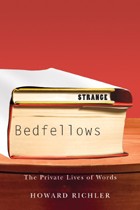
Strange Bedfellows: The Private Lives Of Words
Howard Richler
Ronsdale Press
$19.95
paper
164pp
978553801009
The opening chapters of Howard Richler’s Strange Bedfellows: The Private Lives of Words highlight words related to genitalia, farting, fecal matter, death, torture and blood; other words were originally insults. Perhaps this is for shock value (that old notion that sex and violence sell) or to show that words can be naughty without appearing so. But just as Richler’s focus on naughty words starts to feel like a tiresome obsession, he plunges into terms whose origins can be traced back to a foreign language, mythology, and/or people’s names (the word dunce, for example, comes from John Duns Scotus, a thirteenth century philosopher). Richler – a long-time language journalist and former Gazette columnist – explores the etymology of words whose backgrounds are not only cryptic but surprising. Who would have thought that “Yankee,” an American word if there ever was one, came from Dutch?
In his lexicon, Richler recategorizes and synthesizes information taken from the Oxford English Dictionary (among other sources), adding wit and whimsy. He attempts to get readers interested in etymology and succeeds with flying colours. But his quips sometimes feel forced, like an intruder’s annoying repartee in the middle of a riveting conversation. For instance, when explaining the origin of the word “cereal” (the name of the Roman goddess Ceres), Richler feels the need to finish his entry with: “If Jupiter murdered Ceres, would that make him a cereal killer?” A bad joke, at best. Furthermore, his allusion to current popular events, such as Tiger Woods’ recent marital woes under the “hazard” entry and Harper proroguing parliament twice under “chagrin,” give a certain ephemeral quality to the book. While these references to timely events work in a newspaper column, they don’t fare so well in a book. In fact, they will prevent Strange Bedfellows from ageing gracefully.
Though the lightness and humour of the book make it much more interesting than a dictionary – and Richler’s efforts might certainly inspire readers to refer to the OED, whose gems he reveals, more than they have been used to – some entries can leave one unsatisfied. A striking example of this occurs with the entry “pretty,” in which readers learn that the word used to have a negative sense (it meant “cunning” or “crafty”) and only acquired the sense of “pleasing in appearance” in the fifteenth century. But how and why the shift in meaning occurred, Richler doesn’t say. Likewise, the section on words that come from Yiddish/Hebrew is feeble and frustrating because each word only possibly comes from Yiddish or Hebrew; Richler is never sure, which can make readers wonder why he bothered creating the category.
Strange Bedfellows should not be considered as a definitive reference book. Its purpose is to tantalize word lovers and motivate them to look into the private lives of words on their own. mRb






0 Comments